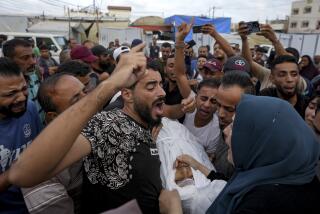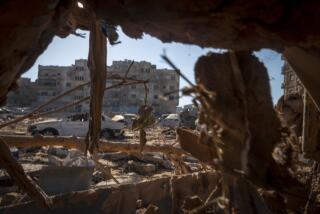Kadafi remains elusive, defiant as fighting continues in Tripoli
Reporting from Tripoli, Libya — Fighting continued in the Libyan capital Thursday as rebel forces pressed the search for the country’s longtime ruler, Moammar Kadafi, who was dislodged from his command-and-control center this week and remains in hiding.
Rebels who overran the city and all but toppled Kadafi’s decades-long rule said they had a group of Kadafi loyalists surrounded in an apartment building close to his Bab Azizya compound, which was ransacked by lightly armed rebel forces following a rapid advance from three directions on the capital. A ferocious gun battle was unfolding in the district.
In a short audio broadcast on loyalist television channels on Thursday, Kadafi called on his supporters to march on Tripoli and “purify” the capital of rebels, whom he denounced as “rats, crusaders and unbelievers.”
“Street by street, alleyway by alleyway, house by house,” Kadafi said. “The tribes that are outside of Tripoli must march on Tripoli. Each tribe must control its area and stop the enemy setting its foot on this pure land.”
It was not clear from where Kadafi’s statement originated. The French magazine Paris Match cited an unnamed intelligence source as saying Kadafi was still in the capital, though earlier such claims have been proven false.
British Defense Secretary Liam Fox told Sky News: “I can confirm that NATO is providing intelligence and reconnaissance assets to the [rebel leadership] to help them track down Col. Kadafi and other remnants of the regime.” He did not specify what those assets were.
But in Washington, a Pentagon spokesman said the U.S. was conducting aerial surveillance in support of the alliance’s military mission to protect civilians from attack but was not targeting Kadafi. The spokesman, Marine Col. David Lapan, said NATO’s mission was not to target or hunt down individuals.
Kadafi’s forces continued to hammer away with rockets at the city’s international airport, now under rebel control, and there were reports of continued fighting between his loyalists and rebel fighters west of the capital along the road to the Tunisian border.
It also remained unclear who controlled the country’s crucial main border with Tunisia, the main supply route for the capital. Some rebels claimed it was under their authority. But journalists who have tried to enter through the crossing said it remained in the hands of Kadafi’s forces.
Despite the occasional clashes, rebels appear to have deepened their hold over much of the capital, especially in areas of the city long hostile to Kadafi. In Souk Joumeh, a district near central Tripoli, shops have begun to reopen.
Rebel fighters reduced the number of checkpoints on the streets the city. And volunteers with shovels and pickup trucks were cleaning up mounds of garbage that had accumulated during the days of unrest.
Police stations began to reopen, with security officials elected by local rebel political representatives. An acting police chief in Souk Joumeh said there were few security problems in his district. “There were some instances of robbery, but nothing serious,” said Shokri Dernawi, a former domestic security official who joined the rebel cause months ago. “Only 50% of the people even know the police station is open.”
A group of Italian journalists kidnapped by pro-Kadafi forces and held overnight were released Thursday after the loyalists themselves decided to let them go.
But fighting continued in the city’s southwest, including the neighborhoods of Abu Salim, Hadba and Salahadin as well as districts along the airport road. Reports from those areas suggested heavy gunfire and street-to-street fighting, with residents huddled inside their homes. There was also a gun battle outside the Corinthia Hotel, a centrally located high-rise where many foreign journalists are staying. Witnesses said a sniper in a nearby building appeared to be firing on the hotel and rebels responded in a 10-minute firefight that eventually subsided.
And though some stores had reopened many people complained of a lack of supplies. A pharmacist said he was running out of blood pressure medicine, insulin and baby formula. Fresh produce appeared to be in short supply.
The lack of law and order had also led to some looting, mostly of buildings associated with Kadafi, his sons and their associates. At the Burj Fatah, an upscale high-rise building which houses the offices for a number of international banks and firms, looters had robbed some upscale electronics and jewelry stores on the ground floor and rummaged through office suites. Not a single rebel was posted to guard the building, where the archives of the Libya Investment Authority, a large fund financed by the country’s oil wealth, are located.
Italian Prime Minister Silvio Berlusconi, meanwhile, met in Rome with the acting chairman of the rebels’ Transitional National Council, Mahmoud Jabril, and promised to provide $500 million to the new government by quickly unfreezing Libyan assets held in Italian banks. Italy, which once ruled Libya, is one of the North African nation’s leading trading partners.
Italy’s ENI, a major partner in Libyan oil and gas production under the Kadafi regime, would provide “large quantities of gas and gasoline for the immediate needs of the population,” the Italian prime minister promised.
Jabril said the funds from outside were essential for rebuilding infrastructures and services in Libya and paying salaries that are four months overdue. Other priorities were reestablishment of order and justice systems, the rebuilding of the Libyan army and preparation to reopen schools in time for the new term.
Health and welfare services for the wounded and returning refugees were also high on the list, as was restoration of power stations, oil and gas distribution.
Times staff writers Henry Chu and Janet Stobart in London, staff writer David S. Cloud in Washington, special correspondent Ryma Marrouch in Tripoli and Reuters News Service contributed to this report.
More to Read
Sign up for Essential California
The most important California stories and recommendations in your inbox every morning.
You may occasionally receive promotional content from the Los Angeles Times.










